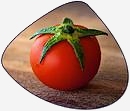Press release
, François-Xavier Branthôme
Water-saving agricultural practices are compatible with high quality tomato products
The Tom’ability research project, which is co-financed by FranceAgriMer in association with the CTCPA and the SONITO, as well as the 408 SQPOV Joint Research Unit (INRA-Avignon University), was carried out in 2017 in order to study the technological suitability of water-saving cultivation practices for growing tomatoes for processing into paste and chopped products.
 The main objectives were:
The main objectives were: - Studying high-performance varieties, suitable for specific environmental constraints and market requirements (suitability for processing).
- Searching for new technical itineraries aimed at decreasing inputs: resistance to hydric stress with a view to reducing crop irrigation.
- Evaluating the suitability of these raw materials for processing.
- Improving the quality (both technological and organoleptic) of the products processed into paste and canned chopped products.
Among the conclusions of this study, it is important to mention a slight increase in yields, in the form of a rise in the soluble solids content produced per hectare under hydric stress conditions. Over two consecutive years, this observation confirmed that the total soluble solids biomass remained at least equal to that of control plants even when the final fresh biomass dropped, which is an expected effect of the application of hydric stress.
These results correspond to the needs expressed by industry operators, whose objective is to improve processing yields in the factories and economize the energy required for evaporating water during the production of pastes, by working with raw materials with a higher soluble solids content.
The viscosity of tomato purées is mainly linked to the total soluble solids content and not just to the Brix value. The size of the particles contained in the product contributes to the product's viscosity. So Cold-Break treatment produces less viscous products with purées that contain particles of a smaller size, unlike products obtained by Hot-Break treatments, which produce more viscous purées.
The results obtained in 2017 confirmed those already observed in 2016, which indicated that there is wide room for maneuver regarding the improvement of tomato productivity, thanks to irrigation that is more focused on maintaining the technological criteria for the quality of purées, rather than just on crop yields.
As for tomatoes aimed at processing into chopped or diced products, the use of hydric stress leads to more difficult peeling, but with pasteurized pieces retaining more firmness and holding better. The Gades variety provided the most satisfying results. Continuous ohmic heating treatment, as an alternative to treatment by tubular heat-exchanger, provides better results in terms of the integrity of the chopped pieces.
 The main results of this project, which can be directly implemented by agricultural operators, processors and manufacturers of finished products in order to increase the value of crops and production, are as follows:
The main results of this project, which can be directly implemented by agricultural operators, processors and manufacturers of finished products in order to increase the value of crops and production, are as follows: - Recommendations regarding cultivation modalities for processing tomatoes, in particular:
• The choice of varieties that should be selected in order to optimize processing yields and orient the characteristics of processed products (purées, diced products) in terms of viscosity, product integrity, firmness, etc.
• The use of hydric stress during cultivation in order to voluntarily modify the technological characteristics of tomatoes intended for processing.
- Recommendations as to the implementation of processing procedures, in particular:
• The use of Cold-Break or Hot-Break processes, in order to orient the viscosity characteristics of tomato purées.
• The use of continuous ohmic heating in the treatment processes in order to improve the quality of pasteurized chopped tomatoes.
Source: ctcpa.org































